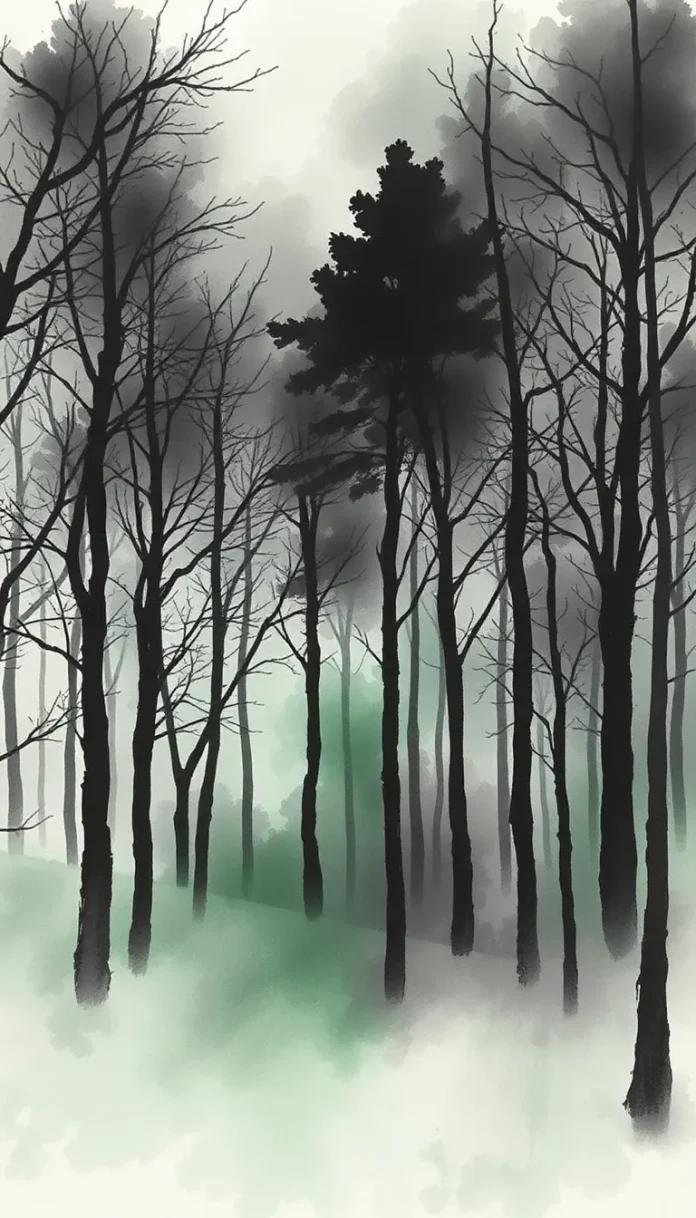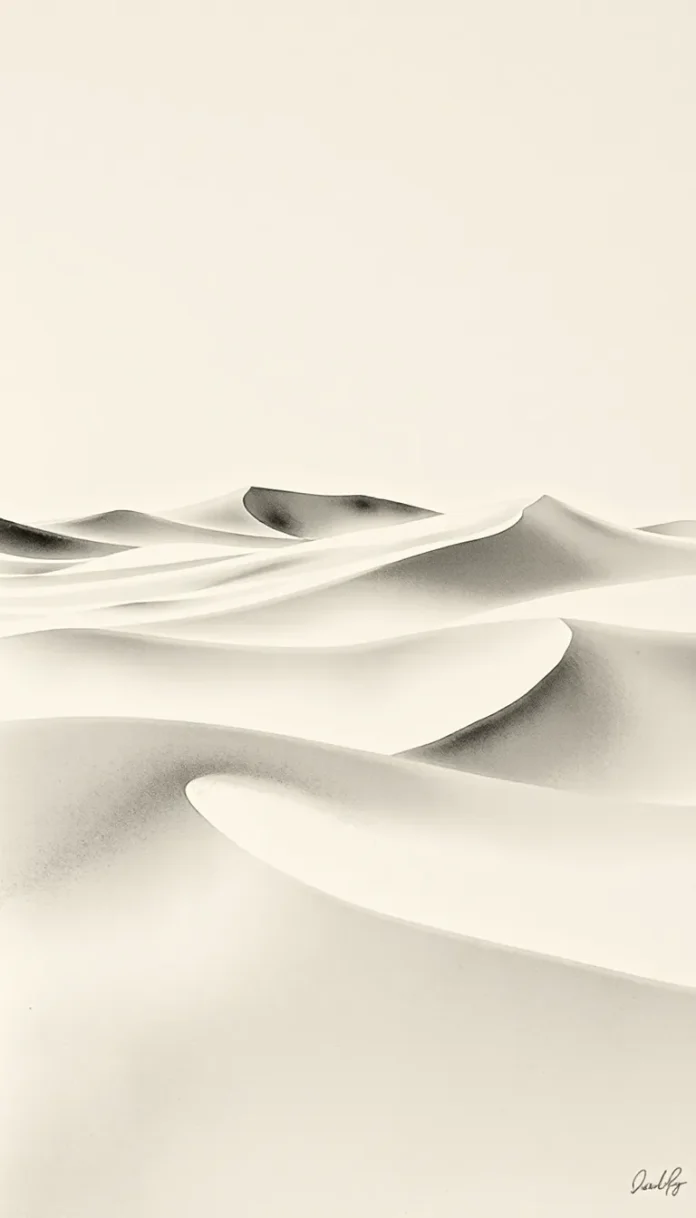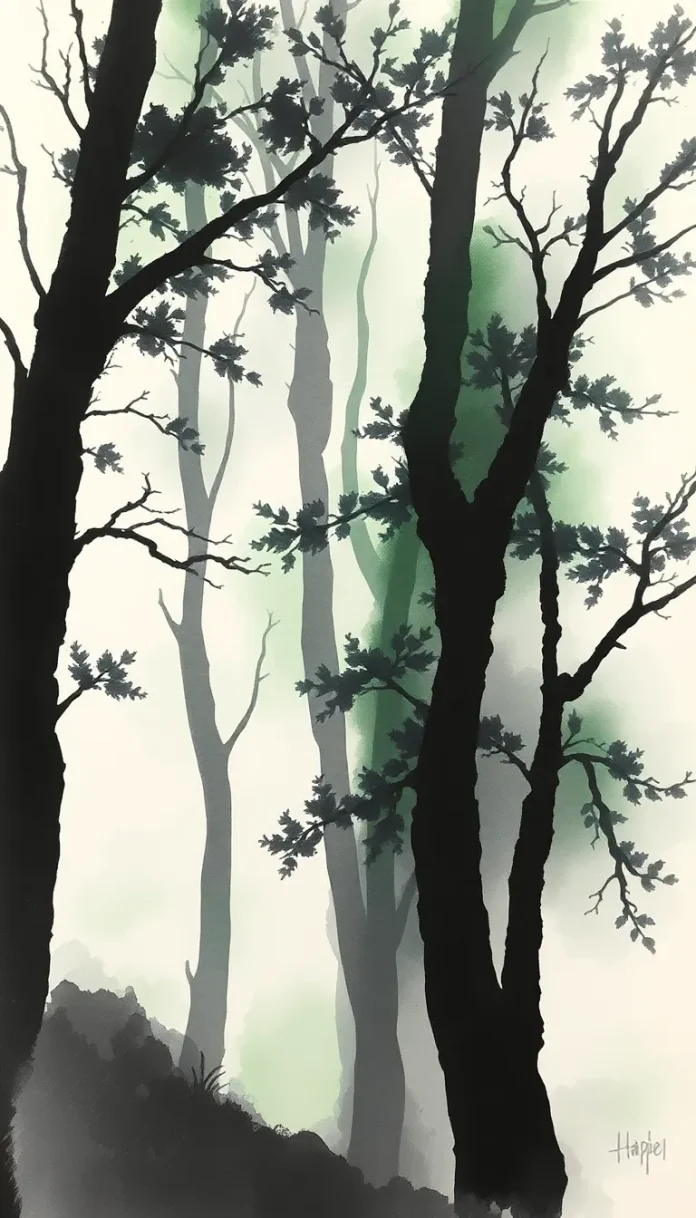Beneath the Heavy Skies of Fate
I.
Beneath a dome of billowing clouds, heavy with unspoken grief and the scent of rain yet to fall, the Marcheur trudged on. His gaunt silhouette merged with the shadows cast by gnarled trees and weathered hedgerows, each step an ode to the odyssey of the human spirit confronted by its own unraveling. The countryside, strewn with the vestiges of autumn’s crimson decay and the silent murmur of distant wind, seemed to echo his inner turmoil—a landscape resisting the relentless march of time, and yet, resigning itself to the inevitability of loss.
“Why must fate so stubbornly insist,” he murmured to the lonesome path, his voice an intimate conversation with the whispering winds, “that I must wander in search of solace, where even solace forsakes its promise?” Thus, his inner soliloquy cascaded like a litany of forlorn desires, a dialogue etched in the murmurs of his beating heart and the solemn cadence of his footsteps.
II.
The path wound through fields once fertile with dreams, now desolate like the relics of a forgotten age; each furrow in the earth recalled the scars of ambition, and each blade of grass bowed in deference to the dominion of a destiny unalterable. The Marcheur’s journey was not of distance but of the soul—a pilgrimage amid the ruins of hopes dashed upon rocky precipices of inevitable despair. Upon a dampened stone bench by a murmuring brook, he paused, watching the ripples carry away fragments of a past he could neither reclaim nor condemn.
As the twilight deepened, his mind became a theater of recollections—images of youthful exuberance that had faded like the embers of a once-vibrant hearth, and memories of vibrant days stolen away by the ruthless passage of time. “I am but a fleeting shadow,” he admitted, gazing into the silvery effervescence of the rippling water, “a traveler vanquished by the relentless specter of fate, whose steps are measured not in hope, but in the quiet resignation of an eternal trial.”
III.
Emerging from the embrace of the brook’s lament, he resumed his journey, haunted by the tale of one solitary figure who personified the inescapable truth: that the condition humaine is an intricate tapestry of joy intermingled with sorrow, and that every quest for identity is beset by the cold touch of fatality. Along the path, the countryside unveiled its own cryptic narrative through the murmuring rustle of leaf and the solemn applause of the wind—a hidden language, decipherable only to those whose hearts bore the scars of infinite yearning.
Beneath ancient oak and solitary elm, the Marcheur encountered enigmatic figures, specters molded by memory and mirage. One such apparition, a silent bystander clad in tattered vestiges of a forgotten garb, met his gaze with eyes like voids ensnaring fragments of lost eras. In a halting dialogue that transcended spoken word, the apparition offered a cryptic warning:
“Not all journeys deliver the solace of truth,
And the destination, cloaked in night, reveals its rue.”
In the echo of those somber words, the Marcheur felt the icy fingers of destiny tighten around his weary heart, each syllable resonant of a truth long concealed within the folds of human frailty.
IV.
Even as the progress of time seemed an interminable dirge, the sweeping landscape of his inner world revealed countless echoes of nature’s bittersweet allegory. Each step on the Sentier de campagne became a stanza in an elegy dedicated to the impermanence of life—a rhythmic melody in which every chorus celebrated the ephemeral, the fragile, and the resigned. The sun, a distant orb shrouded by the mantle of impending rain, painted transient halos around the rugged contours of the land, as though bestowing on every blade of grass and every weathered stone a fleeting measure of grace against the inevitability of oblivion.
Marcheur, with his heart awash in regret yet undiminished in its tender capacity for longing, recalled days when laughter rang freely like the chime of church bells—then a sound of mirth now lost to time’s relentless tide. “Had I known,” he whispered to the murmuring dusk, “that each joy would transmute into sorrow as the evening claims the day?” In that internal lament, he accepted the paradox of his existence: every burst of radiance was tethered to the inexorable descent into darkness, every moment of glory beclouded by the specter of despair.
V.
Within the cocoon of solitude, the Marcheur’s thoughts turned introspective, as if in silent communion with the autumn’s rustling leaves. His mind unfurled memories not only of triumphs and loves past, but of the myriad faces of futility. He revisited a distant episode wherein a cherished companion, a kindred spirit couched in mirth and gentle strength, had fallen prey to the whimsical cruelty of fate. They had once conversed in soft, deliberate tones under the unyielding canopy of starry dreams, sharing hopes and whispered vows destined to evaporate beneath the scorching glare of time. “Life,” his companion had said in a voice tender and yet laced with the wisps of truth, “is the unending dialectic between ambition and the quiet resignation of loss.” That memory, now as palpable as the chill in the evening air, surged forth in an uninterrupted tide of regret and longing.
In the reflective silence of an abandoned orchard, where the fruit of memory lay shattered amongst gnarled branches and brittle leaves, the Marcheur’s heart once again quavered at the brink of despair. In his solitude, he conjured the visage of that long-absent friend, a spectral reminder of what might have been, had the capricious script of destiny written a gentler verse. “Oh, how the fates conspire,” he murmured to the rustling winds, “to carve our lives in letters of sorrow, our truths inscribed by the merciless hand of inevitability.” The word ‘inevitability’ resounded in the still air, a refrain of inexorable fatality echoing the eternal human condition—a truth as immutable as the stars hidden behind somber clouds.
VI.
As the spectral night gathered its darkening shroud and the path began to wane into the embrace of an all-consuming twilight, the Marcheur encountered an expanse of desolate moors where the very earth seemed to lament its own desolation. It was here, amidst the barren and unyielding landscape, that the full weight of his destiny descended upon him. With every step, the world seemed to constrict around him like the coils of an unyielding serpent, each movement a reminder that the passage of time was both a giver of bittersweet memories and a thief of all that dares to dream.
At the center of this melancholy expanse lay a solitary stone monument, its surface engraved with the whispers of unspoken tragedies and hopes that had long deserted the living. The monument, a silent testament to countless souls bound by the tenuous threads of existence, bore the inscription: “All that stirs within the heart must eventually yield to the embrace of fate.” Here, in this solemn reliquary of human despair, the Marcheur paused, his eyes tracing the delicate patterns carved by hands now lost to memory, and felt the inexorable pull of destiny—a force greater than all the fleeting triumphs and regrets that had accompanied him along his weary pilgrimage.
“Do you too, relic of forgotten time, lament the inexorable march of fate?” he questioned softly, the query dissolving into the pervasive murmurs of the moor. In that moment of introspection, the silent monument seemed to respond, its rugged surface resonant with ancient sorrow, as if communicating in a language older than mortal lament. Though no words were spoken, a singular truth resounded in the quiet confines of his soul: the condition humaine is naught but a tapestry interwoven with the threads of suffering and the frailty of human ambition, and Fate—an unerring sculptor of ruin—waits patiently to fashion our final epitaph.
VII.
By night’s descent, when the only illumination came from the trembling glimmers of far-off lighthouses and the subdued luminescence of a hesitant moon, the journey of the Marcheur reached a solemn crescendo. In a final monologue beneath the brooding skies, he confessed to the relentless solitude that had both nurtured and condemned him:
“Each step upon this weary road has borne the weight of dreams unfulfilled,
And though I have traversed lands both wide and wild,
The echo of my soul remains but an unhealed cry,
Caught in the inexorable tide of fate’s unyielding sigh.”
His words, laden with the gravitas of lived despair, mingled with the whispers of the wind, reciting a dirge for every fleeting hope that had been swallowed by the vicissitudes of time. And in that moment, the landscape—ever a mirror to the human condition—seemed to weep with him, the rolling mists and rustling reeds bearing silent witness to the immutable truth that every joy is destined to wilt beneath the shadow of fatality.
VIII.
The road ahead was unfathomable, an endless ribbon that dissolved into the harsh echoes of memory. Yet, the Marcheur, though resolute in his quest for meaning amidst the despair, began to comprehend the cruel paradox: that life, in its most profound essence, is a narrative wrought with bitter irony. The ceaseless march of time, indifferent and majestic, stripped away illusions of permanence, leaving behind only the raw, unvarnished truth: that each step forward is contoured by the sorrow of what has passed, and the final destination is an inescapable, tragic solitude.
Under the cover of a storm-prone sky, the Marcheur wandered into an ancient copse where the trees, like solemn sentinels of fate, bowed with the weight of their own histories. In this natural cathedral, the elements themselves conspired to evoke a symphony of desolation—a cacophony of windswept murmurs and the soft patter of falling leaves composing a requiem for the lost. Here, he recalled the words of a wise elder he once encountered on a forgotten path:
“Know that every human heart is a fragile vessel,
And the currents of destiny, though oft unseen, steer us
Toward an unalterable fate, as certain as the turning of the world.”
Such words, tender yet cruel, resonated deeply within him, reinforcing the somber epiphany that the human spirit, for all its impassioned defiance, is inevitably tethered to the ineluctable forces of chance and misfortune.
IX.
In the final stirrings of that fateful night, when the relentless patter of rain began its mournful cadence upon the earth, the Marcheur found himself standing at the precipice of a rocky ledge—a boundary between the known contours of his painful history and the unfathomable void of the future. Here, beneath the strained heavens and the burden of his countless sorrow-soaked memories, he paused for a moment of intimate reckoning. The air was thick with the perfume of damp earth and the faint, acrid scent of inevitable loss; every element of nature conspired to magnify the melancholy that had become the tenor of his existence.
With a deep, shuddering breath—a solitary exhalation that seemed to expel the remnants of all his fading hopes—he gazed into the abyss below, a mirror reflecting the bleak inevitability of his fate. “I have traversed many lands and encountered both the radiant face of fleeting joy and the relentless specter of despair,” he intoned softly, eyes fixed on the chasm that beckoned like the final verse of a lament. “And now, as the twilight of my journey descends into an eternal night, I find that all roads lead but to a quiet, unyielding sorrow, an echo of an existence bound by the iron chains of destiny.”
X.
Thus, as the cold winds whispered through the barren moors and the heavens wept generously upon the parched earth, the fated end of the Marcheur’s odyssey became unequivocally clear—a silent accord with the merciless decree of fatality. He stepped forward, slowly and inexorably, drawn to the precipice by the magnetic pull of despair and the unalterable law of time. In that final moment—where hope had long been surrendered and dreams lay shattered like the remnants of broken glass—the journey converged with the essential truth of the human condition: that life, with all its transient glory and enduring sorrow, ultimately culminates in a solitude so profound and immutable that even the strongest spirit must yield to its melancholic destiny.
And so, beneath the heavy skies of fate and in the company of the eternal night, the weary Marcheur fatigué du destin embraced the tragic end of his long and arduous quest. No triumphant cry resounded, nor a hopeful promise heralded his final step; it was but a quiet, sorrowful culmination—a testament to the inescapable truth that, in the vast theater of life, every solitary soul must eventually dissolve into the darkness of despair, leaving behind only the echo of a life well questioned and a fate irrevocably sealed.
In the hush of that final hour, as the relentless rain blurred the boundaries between past and present, hope and despair, the land itself seemed to grieve the loss of one more traveler whose every footfall had been a verse in the grand elegy of human misfortune. The silent stone at the heart of the moor bore witness to this sorrowful chronicle, its inscribed words now echoing more resoundingly than ever:
“All that stirs within the heart, when tethered to Fate, is destined to succumb
To the quiet, unyielding embrace of an ending as bitter as the night.”
Thus, with no fanfare or light to dispel the all-pervading gloom, the Marcheur faded into the mists of memory—an indelible symbol of the eternal struggle against the inexorable tide of destiny, a whispered lament in the vast, indifferent expanse of existence.
And in the lingering silence that followed, where only the mournful sigh of the wind bore witness, the ultimate tragedy of this human odyssey remained—a quiet, desolate truth that all vibrant chronicles must, in the end, find their resolution in the somber embrace of a world unyielding, a resolve that is forever, irrevocably Triste.


